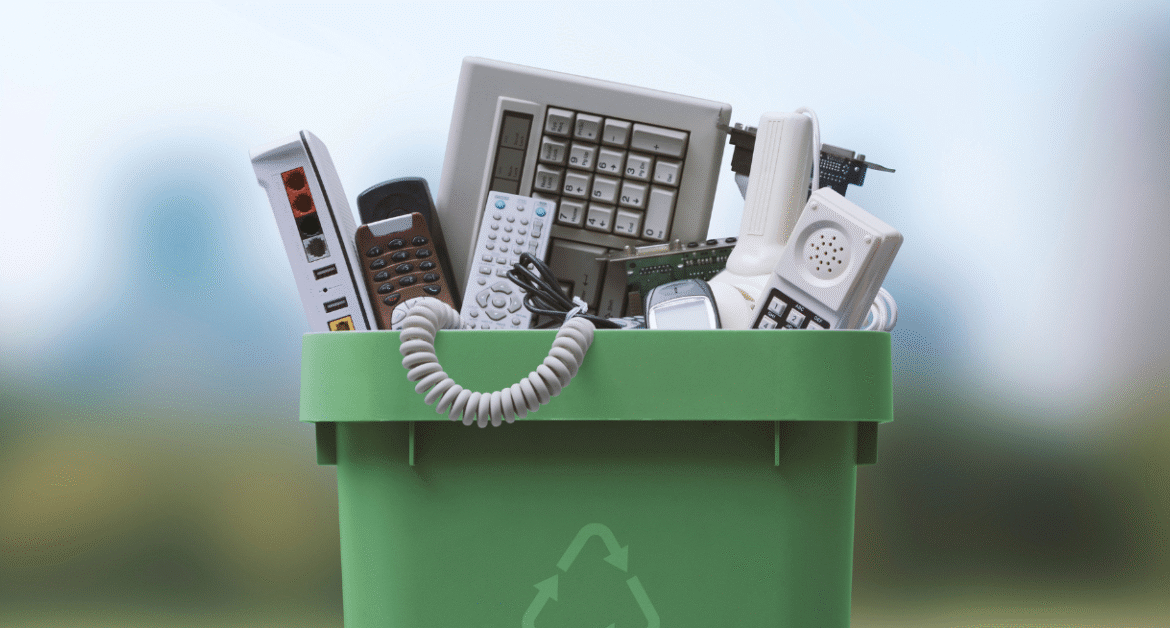In our increasingly digital world, electronic gadgets have become an indispensable part of daily life. From smartphones to smart fridges, our reliance on technology continues to grow. But there's a hidden cost to this convenience: e-waste, or electronic waste. And the UK, unfortunately, is facing a significant challenge in managing it.
What is E-Waste and Why is it a Problem?
E-waste refers to discarded electrical and electronic equipment (WEEE – Waste Electrical and Electronic Equipment) – essentially anything with a plug, battery, or cable. This includes everything from large household appliances like washing machines to small items like mobile phones, kettles, and even Christmas lights.
The problem with e-waste is multifaceted:
Environmental Hazard: When e-waste ends up in landfills, it can leach toxic substances like lead, mercury, and cadmium into the soil and groundwater, contaminating ecosystems and posing serious health risks to humans and wildlife. The manufacturing process of these devices is also energy-intensive, contributing to carbon emissions.
Resource Depletion: Electronics contain valuable and often rare materials such as gold, silver, copper, platinum, and cobalt. When we discard them instead of recycling, these precious, finite resources are lost forever, increasing the need for new, environmentally damaging mining operations.
Economic Loss: The UK economy loses an estimated £488 million per year in valuable raw materials (like gold, copper, aluminium, and steel) by not properly recycling discarded household electricals.
Mounting Volume: E-waste is one of the fastest-growing waste streams globally, and the UK is no exception. The amount of household Electrical and Electronic Equipment (EEE) placed on the market has increased by 25% since 2018. While collections have also increased, only around 30% of the 1.652 billion kg of e-waste generated by the UK is currently recycled. This puts the UK significantly behind other European nations like Norway (nearly 74%) and Holland (59%).
A particular concern is the rise of “FastTech” – cheap, everyday electricals with short lifespans. Almost half a billion FastTech items were thrown away last year, with a shocking 90% discarded soon after purchase, further exacerbating the problem.
The UK’s Response: WEEE Regulations and Beyond
To address this growing issue, the UK operates under the Waste Electrical and Electronic Equipment (WEEE) Regulations, which came into force in 2007 (derived from the EU WEEE Directive). These regulations aim to:
Reduce E-waste Production: Encourage manufacturers to design products with longer lifespans and easier recycling.
Promote Reuse and Recycling: Mandate that producers, retailers, and distributors facilitate the collection, treatment, and recovery of WEEE.
Shift Responsibility: Make producers financially responsible for the recycling and environmentally sound disposal of their products.
Under these regulations, you’ll see the “crossed-out wheelie bin” symbol on electrical goods, indicating they should not be disposed of with general household waste. Retailers are also obligated to provide take-back schemes for old electricals, either in-store (often on a like-for-like basis when purchasing a new item) or through other accessible collection points. From 2026, larger retailers will be required to establish in-store “collection drop points” for electrical items, and physical and online retailers will be obligated to collect broken or rejected large electrical goods during the delivery of replacement products.
The not-for-profit organisation Material Focus also runs the “Recycle Your Electricals” campaign, providing a UK-wide resource with nearly 30,000 drop-off points for electrical items.
What Can You Do? Be Part of the Solution!
While regulations and initiatives are crucial, individual actions play a massive role in tackling the e-waste crisis. Here’s how you can make a difference:
Reduce and Reuse First:
Postpone Upgrading: Do you really need that new phone or gadget? Consider whether your current device still meets your needs.
Repair: Many small electricals can be repaired. Look for local repair shops or manufacturer-authorised repair networks.
Donate or Sell: If your device is still in good working order, give it a new life! Donate it to a charity, sell it on platforms like Gumtree or Facebook Marketplace, or offer it to friends and family. This extends its lifespan and prevents it from becoming waste prematurely.
Recycle Responsibly:
Use Designated Collection Points: Never put electrical items in your regular bin. Utilize local authority e-waste recycling schemes, Household Waste Recycling Centres (HWRCs), retailer drop-off points, or dedicated e-waste recycling centres. Use the Recycle Your Electricals website to find your nearest location.
Remove Batteries: If possible, remove batteries from devices before recycling, as they often require separate handling and can pose fire hazards if improperly disposed of.
Wipe Your Data: Before recycling or donating devices like phones, laptops, and computers, always erase your personal data to protect your privacy.
Choose Sustainably:
When purchasing new electronics, consider products designed with sustainability in mind – those made from recycled materials, with energy-efficient features, and with a clear end-of-life plan for recycling or reuse.
Support manufacturers who offer take-back schemes and actively promote circular economy principles.
E-waste is a significant challenge for the UK, but by understanding the problem and taking proactive steps, we can all contribute to a more sustainable future, turning our discarded gadgets from a liability into a valuable resource. Let’s work together to ensure precious materials are recovered, environmental damage is minimised, and a truly circular economy for electronics becomes a reality.
Need to Dispose of E-Waste? We’re Here to Help!
Don’t let your old electronics add to the UK’s e-waste problem. For safe, legal, and eco-friendly disposal, our fully licensed waste collection services are at your disposal.
Our Services Include:
Domestic & Builders’ Waste Removal
Garden & Hardcore Clearance
Wait and Load Service
Scrap & Demolition Clearance
Proudly serving Hertfordshire and North West London, we’re committed to giving you safe, legal, and eco-friendly service – every time.
Contact us today for a free quote or to book your hassle-free, fully licensed waste collection.

